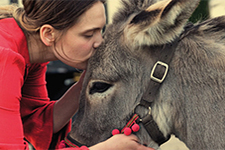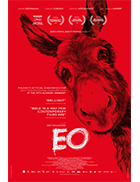EO
|  Being a fervent admirer of Robert Bresson’s Au hasard Balthazar (1966), which is one of the great masterworks of European cinema and a singular film that I count among a small handful of my most moving, emotional cinematic experiences, I have been understandably skeptical of Jerzy Skolimowski’s EO, which, while not quite a remake of Balthazar, is nevertheless so similar in structure and spirit that one cannot consider them apart. My admiration and emotional attachment to Bresson’s film had convinced me that there was really only room in the universe for one soulful, allegorical drama about the life of a donkey, an admittedly reverential conviction that I was sure a viewing of EO would only bolster. But, as it turns out, I was wrong. Quite wrong. While not a masterwork on Balthazar’s level (Jean-Luc Godard famously and accurately described it as “the world in 90 minutes”), EO is nevertheless a deeply moving, beautifully wrought, and keenly reflective film that takes the same basic narrative structure and thematic intent, but still finds new avenues of dramatization of and insight into all the good and bad that humanity has to offer. The title comes from the onomatopoeia name of the film’s donkey protagonist, who we first meet in the otherworldly opening shots, which are bathed in garish red light and shot in disorienting extreme close-ups that initially suggest, in conjunction with ominous musical chords by composer Pawel Mykietyn, that something horrific is happening. As it turns out, it is just an act in a small, travelling circus in rural Poland, with EO playing with his trainer, Kasandra (Sandra Drzymalska), who loves and treasures him. The first instances of abuse come from the carnival’s brutal, drunken owner, who uses EO for labor, pulling wagons of junk to a local scrap metal yard. When he returns, he is greeted with a hoard of animal-rights protestors and a lawyer informing him that the carnival has gone bankrupt and everything, including all the animals, is being repossessed. EO is taken away from a tearful Kasandra, shut away in the back of a trailer and hauled off to the first of his many uncertain futures. Those futures eventually include a high-end horse farm, where is used as labor while the horses, who pose with fashion models, are bathed and massaged; a small village filled with soccer hooligans; a mink farm that epitomizes human cruelty toward animals; the grounds of a chateau owned by a wealthy countess (Isabella Huppert); and a cattle ranch. The people with whom he interacts ran the gamut, from genial and kind, to casually cruel. He is surrounded by laughing children, is nearly beaten to death by angry soccer players, and bears witness to an act of violence so sudden and so seemingly random that I had to take several minutes to process what I had just seen. At one point he is rediscovered by Kasandra, who brings him a sparkling candle for his birthday, but is soon forced to leave by her gruff, motorcycle-riding boyfriend. Like Anne Wiazemsky’s Marie in Balthazar, Kasandra is warm-hearted and loving, but simple and ineffective, which makes her easily manipulated by others and a victim who cannot save herself, let alone EO. In this respect, EO lacks the spiritual power of Bresson’s film, which embodied more so than any of his other films the power of grace and transcendence in death, whereas EO leaves us with a sense of loss unleavened by the promise of what comes next. And, while EO closely approximates Au hasard Balthazar’s structure, it also differs wildly in its aesthetic approach, which more than anything makes it its own animal, so to speak. Skolimowski, who is 84, emerged from the same Polish state school of cinema that produced Andrzej Wajda and Roman Polanski (with whom he cowrote 1962’s Knife in the Water). He has directed 17 films over the course of his long career, and he is clearly not interested in trying to replicate Bresson’s austere style. Instead, he and cinematographer Michal Dymek turn EO into a cascade of artistic approaches, with each sequence incorporating a different aesthetic approach while still being bound together by the film’s recurring, red-lit flashbacks and buttressed by Mykietyn’s magnificent score. As EO is repossessed, traded, lost, stolen, and saved, Skolimowski heightens his story with imagery that is at times epic (soaring tracking shots through the sky, painterly compositions, a nocturnal journey through a fairy tale forest worthy of Disney at his darkest) and at other points achingly intimate (EO is shot frequently in shallow-focus close-ups that emphasize his unmoving, yet deeply expressive face and eyes). There is a magisterial quality to the film, and it veers at times into the realms of the fantastical and the surreal, with Skolimowski favoring oblique shots that only gradually reveal themselves. At the same time, the film is often documentary-like in its depiction of the world through which EO travels, which makes the scenes where animals are mistreated (particularly the aforementioned mink farm) all the more difficult to watch (a disclaimer at the end of the film, which begins by informing us “This film was made out of our love for animals and nature” assures us that no animals were actually harmed). I was completely engaged throughout the film and felt sharp pangs of genuine hurt when it ended, and hours later I found myself wondering about a question fundamental to both EO and Au hasard Balthazar: Why a donkey? What is it about donkeys that makes them such simultaneously opaque and revealing creatures? Perhaps it is their lack of obvious personality and emotive behaviors. Unlike dogs, for example, who are constantly enacting their emotions, donkeys have a kind of stillness, which means that each ear twitch, neck sway, or turn takes on a larger significance. They seem to be entirely in their own world, and yet quietly comprehending of ours. It is as if they are taking everything in and holding it, and we struggle and look for a response, imagining that we see it in the sway of their neck, the intensity of their stare, the quiet fortitude of their stance. Strong and stubborn, and yet undeniably endearing, EO is as compelling and moving and tragic a character as you are likely to find in any film this year. Copyright © 2022 James Kendrick Thoughts? E-mail James Kendrick All images copyright © Janus Films |
Overall Rating: 


 (3.5)
(3.5)


